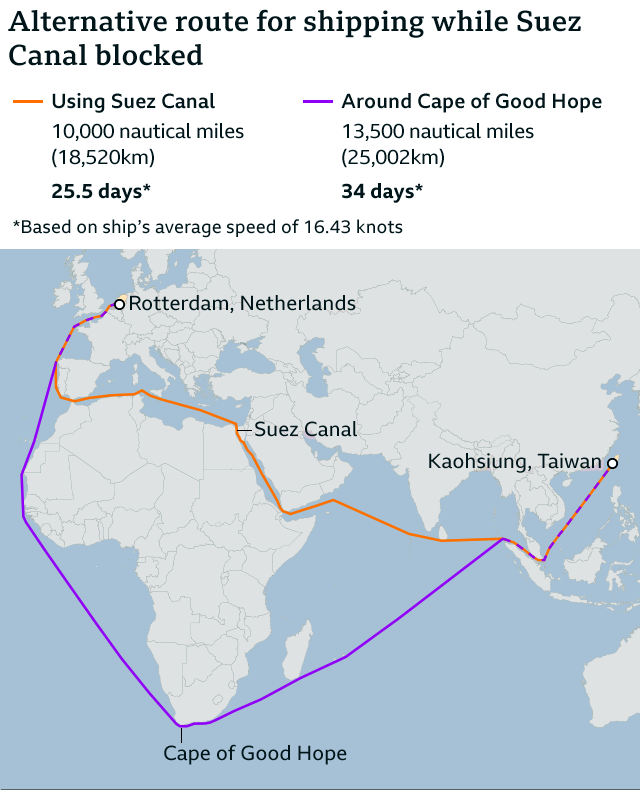Indian Polity
Suez Canal Blockade
- 31 Mar 2021
- 5 min read
This article is based on “Suez crisis and the fragility of global trade” which was published in The Hindustan Times on 28/03/2021. It talks about the issues emanating out of the blockade of Suez canal.
Recently, the Suez Canal, one of the world’s most critical transit routes, got blocked due to a large container vessel, the MV Ever Given. This has caused enormous disruption to global shipping.
This temporary closure has been very expensive for global trade, as it is estimated that the loss per hour is almost $400 million. The negative impact on the intricate and delicately balanced global supply-chain and oil prices will impose additional costs on the customer globally.
Suez canal closure leads to a cascading downstream disruption of trade and economic consequences. This aspect points to the fragility of global trade and needs to strengthen them.
Suez Canal: Background
- The origins of the Suez Canal go back to the ancient period and the first waterway was dug during the reign of Senusret III Pharaoh of Egypt (1874 BC).
- However, this rudimentary canal was abandoned due to silting and reopened several times in the intervening centuries.
- The modern Suez was built in the mid-19th century through efforts by the French and opened for navigation on November 17, 1869.
- In 1858, the Universal Suez Ship Canal Company was tasked to construct and operate the canal for 99 years, after which rights would be handed to the Egyptian government.
- Located in Egypt, the artificial sea-level waterway was built between 1859 and 1869 linking the Mediterranean Sea and the Red Sea.
- The Suez Canal is pivotal in connecting Europe and Asia, as it negates the need to navigate around the Cape of Good Hope in Africa and thus cutting distances by up to 7,000 km.
- The Suez Canal put Egypt at a strategic junction between Asia and Europe. In the wave of assertion by colonies and quasi-colonies, Gamal Abdel Nasser nationalized the canal in 1956.
- In order to protect the corporate interests that hinged on the Canal, Britain, France, and Israel invaded Egypt. This war was termed the Suez Crisis 1956.
Significance of the Suez Canal
- Enabler for Colonisation: The construction of the Suez Canal was a tectonic development for global maritime connectivity and impacted colonial history in a definitive manner.
- The rise of the British Empire was enabled considerably by this canal.
- Life-line of Global Trade: The canal continues to be the lifeline for all trade between the West and East as 10% of the global trade passes through it every year.
- The value of goods shipped through the canal is estimated to be $9.5 billion daily and the canal generates a major share of the revenue for the Egyptian government.
- One of Global Choke Points: The Suez along, with the Panama canal (that links the Pacific and Atlantic oceans), are the two most critical canals in the global maritime domain along with the Volga-Don and the Grand Canal (China).
Impact of Suez Closure
- The Suez situation could compound issues for a supply chain already under pressure from the pandemic and a surge in buying.
- The closure could affect shipments of oil and natural gas from the Mideast to Europe.
Conclusion
It turns out, that while much has changed from 1869 and 1956 - “data is the new oil”, after all a large part of the global economy still runs on the very real grooves left by history.
Given the scale of the consequences of both fiscal and supply-chain disruption — the need to objectively review existing procedures and protocols specific to the Suez merits the highest priority.
|
Drishti Mains Question Suez canal closure points to the fragility of global trade and needs to strengthen the supply chain. Discuss. |







